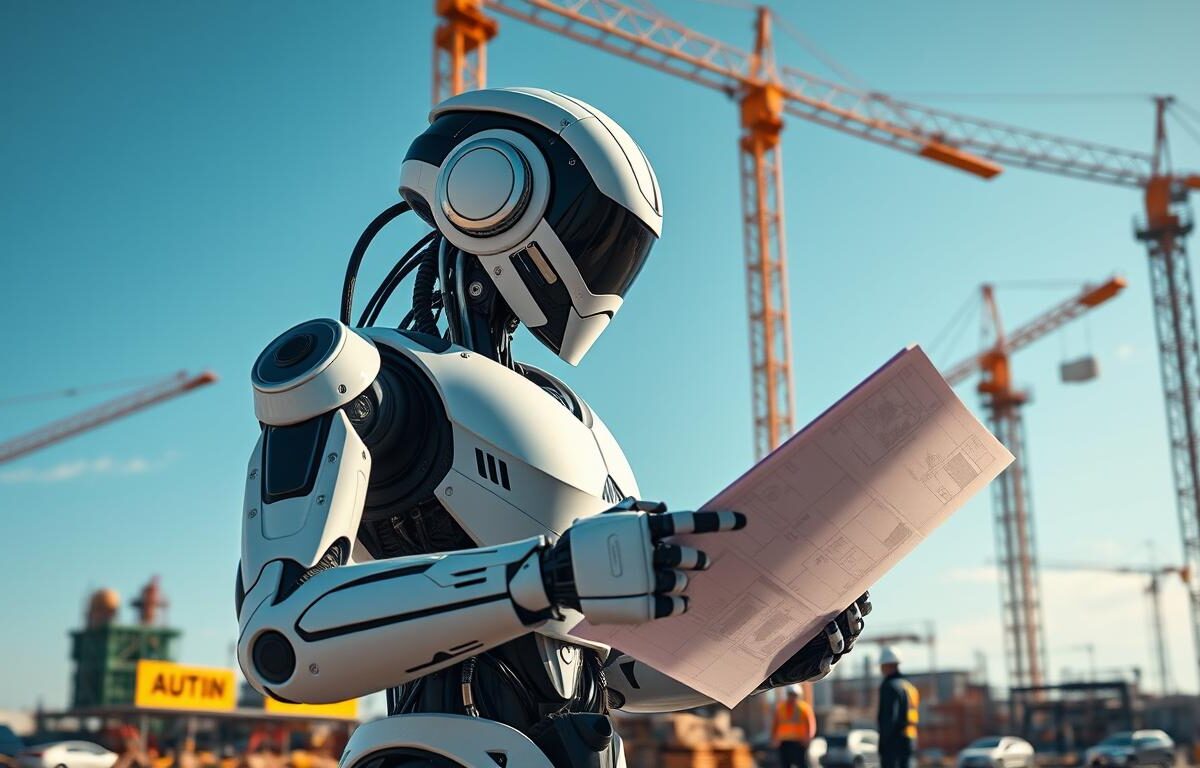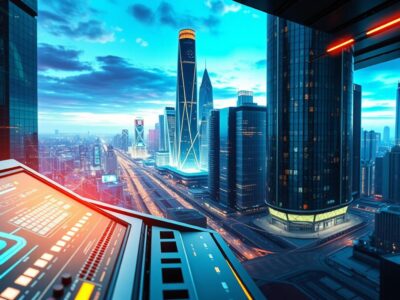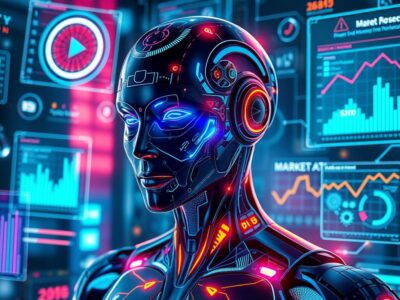AI agent solutions are changing how construction projects are done today. The construction industry is huge, worth over $10 trillion. This is about 13% of the world’s economy. Because of this, using advanced technology is key to stay ahead. An AI agent for the construction industry makes things run smoother. They help with project management and analyzing data on the go.
This wave of technology could lead to the market being worth $8.6 billion by 2031. AI is contributing to better planning and managing of projects. It could add $1.6 trillion to the market every year. One construction firm worked with Attri and cut down time for selecting materials by 45%. They also saved 35% in costs.
AI agents in the construction field means using resources better and making smarter decisions. This can save a lot of money and improve results. Nowadays, 92% of construction companies are either using AI or plan to. These tools are a game changer. A virtual assistant can offer custom help for every project, making sure all needs are met.
Key Takeaways
- The global AI in construction market was valued at $496.4 million in 2021.
- The market is projected to grow with a CAGR of 34.1% from 2022 to 2031, reaching $8.6 billion by 2031.
- 92% of construction companies have reported integrating or planning to adopt AI technology.
- AI agent solutions reduce materials selection time by 45% and decrease costs by 35%.
- Generative AI technologies improve efficiency, sustainability, and cost-effectiveness within the construction industry.
Introduction to AI Agent Solutions in Construction
AI agent solutions are changing the construction industry. These digital solutions for contractors use advanced software that can work on its own. They improve how we analyze data, make decisions, and do tasks automatically. As construction changes, it’s important to fix inefficiencies and do things better.
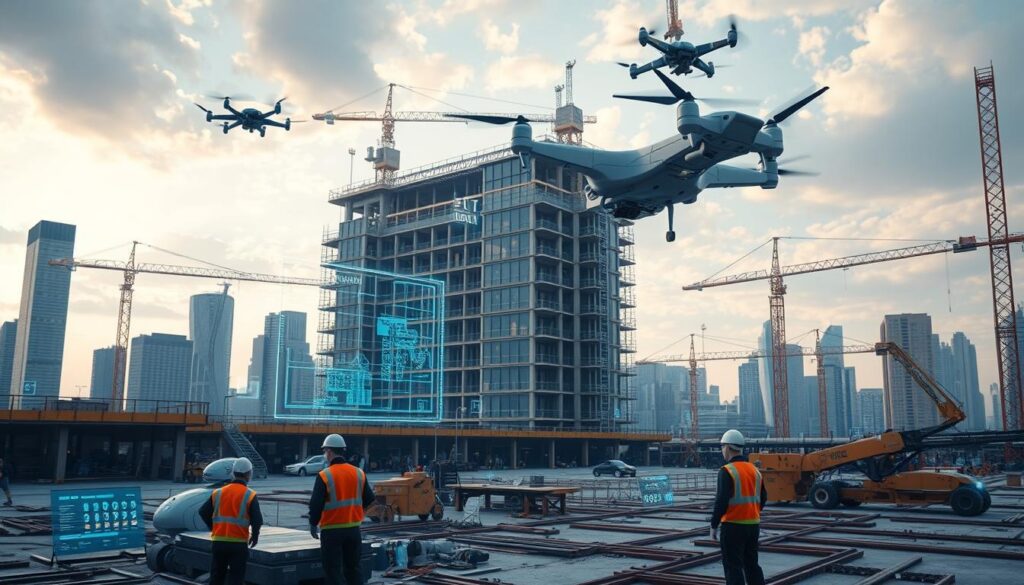
AI-enhanced construction management leads this change. AI agents help manage projects by predicting delays and using resources well. They help construction firms use their resources better, improving project times and outcomes. For example, AI in platforms like BuilderChain helps manage supply chains better, reducing delays.
AI agents also work on construction sites, doing things like surveying with drones and using robots. These smart technology for construction firms make work more efficient and safer. AI agents analyze data fast, cutting down review times by up to 60% in some areas.
Take BuilderPay, which uses AI to handle financial tasks in construction. It makes managing payments and financial workflows easier. AI helps with escrow management too, making transactions smoother.
The future of AI in construction looks bright. We might see more advanced machines, better design through AI, and strong maintenance systems. As AI grows, it will help solve old problems, making construction more efficient, cheaper, and safer.
Benefits of AI Agents for Construction Companies
AI agents bring many improvements to construction. They make work faster, safer, and more green. Tools like automated management and chatbots change how we build, impacting many areas.
Increased Efficiency and Productivity
AI agents are great at doing routine tasks quickly and well. This lets workers focus on harder problems. It helps avoid mistakes and keeps projects on schedule. Tools on the web make team work even better.
Cost Management
AI helps avoid spending too much and uses resources wisely. SaaS solutions let companies use great software cheaply. This leads to smarter choices and keeps budgets in check.
Enhanced Safety
Using AI to predict danger makes work sites safer. For example, Skanska cut accidents with AI. Built Robotics uses AI to do risky jobs, keeping people safe.
Improved Quality Control
AI watches over projects to make sure they meet standards. PCL Construction uses drones for this. It shows how AI helps keep an eye on things.
Sustainability
AI helps use less material and supports eco-friendly building. It finds the best way to build with less impact on the planet. This promotes building that’s good for the earth.
Below is a table summarizing AI benefits:
| Benefits | Description |
|---|---|
| Increased Efficiency and Productivity | AI automates routine tasks, allowing human workers to focus on complex issues. |
| Cost Management | Predictive analytics prevent budget overruns, optimize resource allocation. |
| Enhanced Safety | AI predicts potential hazards, automates safety tasks, and reduces accidents. |
| Improved Quality Control | Continuous monitoring of standards adherence using AI-driven tools. |
| Sustainability | Optimizes material usage, reduces waste, and supports eco-friendly methods. |
AI-Enhanced Project Planning and Management
Adding AI to project planning has changed the construction world. Thanks to AI-driven project optimization, it uses real-time data and forecasts delays. This allows for smarter scheduling, helping projects finish on time.
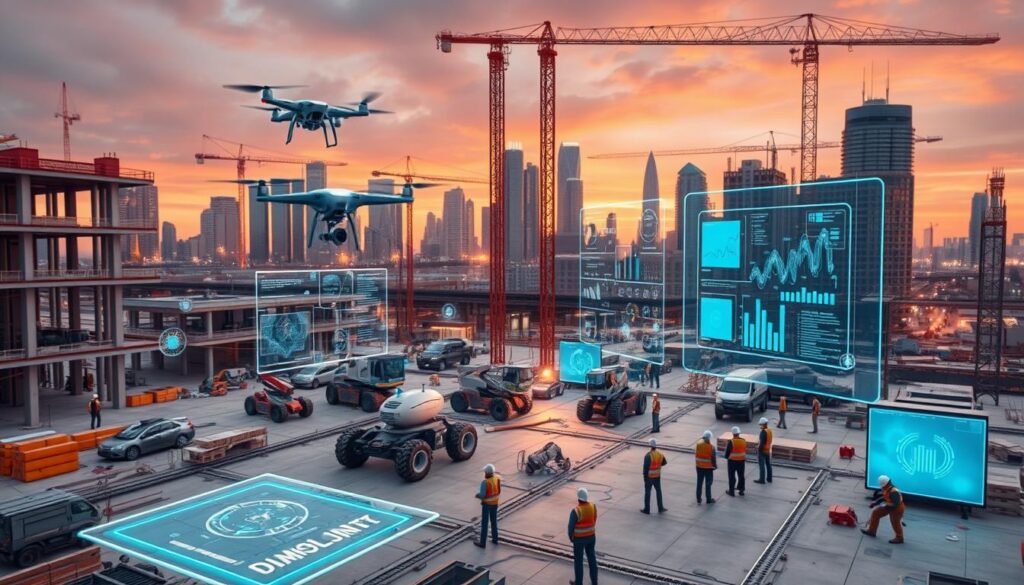
AI makes decisions faster by analyzing big data. Tools like TensorFlow and PyTorch are key in improving project strategies. Autodesk Civil 3D, with its AI algorithms, makes designing in civil projects more effective.
Platforms like AWS, Google Cloud, and Microsoft Azure give the power to train AI models. They manage huge amounts of data with tools like Hadoop and Apache Spark. This is part of what makes AI-driven project optimization work.
AI-enhanced project planning and management shines in how it uses resources. It cuts down on waste and keeps budgets in check. It also makes construction sites safer by foreseeing and stopping hazards.
AI improves quality control by watching over construction in real time. This ensures high-quality results. Sensor tech feeds AI systems data about the structure’s health, aiding in safety and quality.
AI also helps the environment through smart construction choices and automated processes. It reduces mistakes and uses Building Information Modeling (BIM) for better project visualization.
By using AI-driven robots, construction becomes faster and less burdensome. This technology excels over humans in tasks like inspecting bridges, finding cracks and corrosion more accurately and boosting safety.
The table below shows how traditional construction compares with AI-enhanced methods:
| Aspect | Traditional Methods | AI-Enhanced Methods |
|---|---|---|
| Decision-Making | Manual, prone to human error | Automated, data-driven |
| Scheduling | Static, with potential delays | Dynamic, predictive adjustments |
| Resource Allocation | Manual, often inefficient | Optimized, minimizes wastage |
| Quality Control | Periodic, miss potential defects | Continuous, real-time monitoring |
| Safety | Manual inspections | Predictive, hazard prevention |
| Sustainability | Limited | Enhanced, environmentally conscious |
| Project Timelines | Prone to overruns | Adheres to schedules |
Autonomous AI Agents in Field Operations
Autonomous AI agents are changing the game in the construction world. They boost efficiency and safety on-site. Drones and robots are now common for tasks like surveying and building. These AI tools do boring or dangerous jobs, cutting down mistakes and making everything safer. So, using autonomous AI speeds up building, makes it more accurate, and lowers risks.
Using autonomous AI brings big benefits, like making work flow smoothly and putting an end to repeat tasks. By using AI, construction sites work better and faster. Workers get to do more important jobs instead of boring ones. This means companies can use their teams better and save a lot of money by cutting costs.
AI systems, like BabyAGI, get better by learning from around them. This means they can tackle bigger building projects easily. They use tech like GPT-4 to understand and use data better. This helps companies make smarter choices, keeping them ahead in the game. For more on how AI is changing building, check out the smart construction field operations page.
FAQ
What are AI agents, and how are they utilized in the construction industry?
AI agents are smart software designed to work on their own. They handle tasks like analyzing data, making decisions, and carrying out complex jobs. In construction, they help by making planning, doing the work, and checking it all more efficient. This improves how well jobs are done, controls costs, makes things safer, and ensures higher quality.
How do AI agents improve efficiency and productivity in construction projects?
AI agents take over routine jobs. This lets humans focus on harder problems. By making processes smoother, cutting down on mistakes, and speeding up timelines, productivity goes up.
Can AI agents help in managing construction costs?
Yes, by predicting budget issues and better managing resources, AI agents help reduce costs. This makes managing finances in construction projects easier.
How do AI systems enhance safety on construction sites?
They can guess where dangers might happen. This helps workers follow safety rules better and lowers accident chances. These systems watch over sites in real-time, pushing for safer work places.
What role do AI agents play in quality control within the construction industry?
AI keeps a careful check on work quality, ensuring results meet set standards. It quickly finds and helps fix any mistakes, making sure the final work is top-notch.
In what ways do AI agents contribute to sustainability in construction?
AI makes using materials and reducing waste smarter, which is better for our planet. It supports the creation of buildings that use less energy, lowering their impact on the environment.
How do AI-enhanced project planning and management systems work?
These systems analyze data in real-time and make smart predictions and decisions. They foresee delays, plan ahead for resources, and improve planning over time. This makes managing projects much smoother.
What types of autonomous AI agents are used in field operations?
Drones and robots are examples of AI agents used on construction sites. They do tasks like surveying and building safely and efficiently. These tools handle the repetitive or dangerous work, boosting safety and how well operations run.
What are the benefits of using robotics in construction?
Using robots in construction speeds up work, enhances precision, and reduces mistakes. They do risky jobs, which lowers the chance of human workers getting hurt.
How can AI-driven project optimization improve construction scheduling?
Intelligent algorithms in AI-driven optimization forecast hold-ups, tweak schedules on the fly, and manage resources well. This leads to finishing projects on time.
